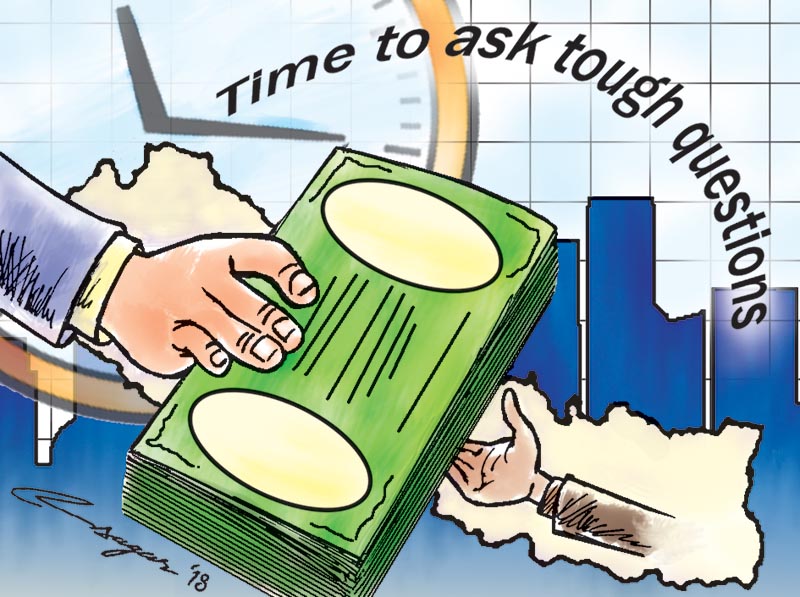'Yes, ask those tough questions about foreign assistance!'
Foreign assistance should not be a mystery. If a donor is not forthcoming, the government, the media and the people should ask just what it is they are trying to hide. That is why I welcome the tough questions. Citizens should be asking…
Over the next five years, the US is positioned to invest over $1.2 billion (120 billion rupees) in Nepal’s success. This foreign assistance is designed in collaboration with the Nepali government and supports Nepali priorities and strategies. It delivers results for the people, and comes solely in the form of grants, not loans. The government and people of Nepal are right to ask questions about foreign aid. Let me share some details of the United States’ approach with you, because Nepalis should know. Fundamentally, it is about: 1) having an objective – for us that is to support a strong, stable, prosperous, and sovereign Nepal; 2) focusing on what is truly needed; 3) quality programs; 4) local engagement; and 5) transparency and accountability.
While America has a great tradition of philanthropy, ultimately we provide aid to advance our interests. An inclusive, democratic Nepal that provides stability in the heart of Asia is in the US interest. A vibrant Nepali economy is a reliable trading partner for America. We are heartened to foster a healthy, educated, and food secure population which is able to achieve its own version of “the American dream” — full self-realization — amongst the Himalayas. These objectives advance both the United States’ and Nepal’s development goals. And we are happy to invest in the success of a partner to ensure that these goals become a reality. The US only provides grant assistance – not loans – because a successful, sovereign Nepal is not a Nepal indebted to others.
Being smart with our resources means putting them to use where we truly add value, not just giving money. That is the difference between being a donor and being a partner. Sure, in the past we built the road from Bharatpur to Hetauda, established Nepal’s first telephone exchange, and the Bhote Koshi hydropower plant. And, our MCC Compact will soon provide an electricity transmission line to link power generation to businesses and consumers. But many can lay concrete and steel. Increasingly the US lends value not through building things, but sharing our innovation and expertise. Over the course of 70 years US support helped Nepal eradicate malaria, created community forest users groups and Female Community Health Volunteers, modeled new agricultural techniques, and restored Gaddi Baithak. Peace Corps Volunteers taught a generation to speak English while projects today teach a new generation to read for comprehension. Our training of masons and construction inspectors ensures that as Nepalis build back from the Gorkha earthquake, they build back better. Decades of capacity building and technical assistance have supported many of Nepal’s successes without laying a single brick. And, a successful country requires a capable society, not just a strong government. By working through proven international NGOs, we are able to share global expertise that builds the capacity of both government and civil society, ensuring Nepal’s success. By bringing best practices proven around the world, basing our efforts on data and evidence, and strictly monitoring performance, we ensure that quality efforts yield results.
American taxpayers work hard for the assistance dollars we provide, so we expect results that will last. Nothing ensures sustainability like local ownership. That is why US assistance starts with marrying our shared interests with Nepal’s own priorities and directly involving the communities impacted. When Nepal’s own progress made it eligible for an MCC Compact, we started by conducting a joint analysis of what constrains the economy. When we identified access to electricity and high transportation costs as key limitations, we worked with the ministries of energy, transportation, and finance to strategize how a massive US grant could accelerate the Nepali Government’s own electricity transmission and road maintenance master plans. As Nepal rolls out federalism, our projects proactively reach out to local officials and a cross-section of communities to facilitate dialogue to inform plans for community health centers to deliver services better. We worked directly with the Electoral Commission and communities on voter education. The examples abound. And, we prominently display an American flag on our work not only as a seal of assurance to communities that the support provided will be of the highest quality, but also so communities can hold us accountable for implementation if there are problems.
Accountability is important to the United States. American citizens insist on knowing where and how their tax dollars are spent. We spend a lot of time on monitoring and evaluation. These efforts provide key data to verify that we are achieving results and offer mechanisms for early intervention to correct our course when we are not. Beyond accountability to Americans, Nepalis too should know what is happening in their country. The solution? Transparency! Each year, we provide annual public reports to the US Congress and the Government of Nepal. Even better, all of USAID’s budget information is publicly available at foreignassistance.gov. Moreover, usaid.gov allows users to view and download over 50 years of assessments and reports. Check it out, it is there for you.
Foreign assistance should not be a mystery. If a donor is not forthcoming, the government, the media, and the people should ask just what it is they are trying to hide. That is why I welcome the tough questions. Citizens should be asking… Is that project really in Nepal’s national interest? Does it provide jobs or convey skills to Nepalis? Does it put us in debt, and how much? Is this project sustainable? Is the community or government engaged? Does that project align with Nepal’s national priorities? Ask these tough questions and insist on community involvement. Nepalis should know!
Teplitz is US Ambassador to Nepal






